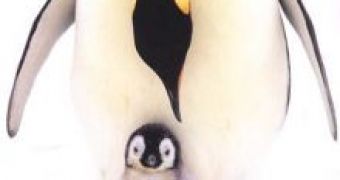Why do female emperor penguins that have lost a baby sometimes kidnap the chick of another? This behavior has puzzled the scientists for a long time for two reasons: 1) Why they do this in the first place? (Because, while the penguins' behavior is largely determined by their genes, the mother's genes have no benefit whatsoever from the kidnapping - the chick isn't genetically related to the mother that kidnaps it.) 2) If the mother has kidnapped a chick, why does it abandon it after a short while leaving it helpless to die?
"The kidnapping lasts for a few hours or a week at most," said Olivier Chastel, a biologist at the French National Center for Scientific Research in Villiers en Bois. "The abandoned hungry chicks usually die from the cold or predation. There is no clear evolutionary advantage."
But now the French scientists seem to have unraveled the mystery. The cause seems to be the unusual hormonal chemistry of emperor penguins. The female birds produce a certain hormone, called prolactin, involved in parental behavior. But while in case of most birds the levels of prolactin drop when the eggs are removed from them even before they hatch, in case of penguins the prolactin levels remain high for a long period.
This is due to the unusual nesting behavior penguins have - as it was documented for instance in the March of the Penguins melodrama. After laying their eggs, the females go to the ocean to feed and then return to their male partners - a journey that takes up to two months. Meanwhile, the males, who haven't eaten anything in the entire period, have incubated the egg. When the females return, after the chick has hatched, they also go to the ocean to hunt.
The high level of prolactin hormone is what determines the mother to come back for its chick. The side-effect is that when her chick is nowhere to be found, her parental instincts are unsatisfied. This is what favors the attempts, sometimes successful, to kidnap a chick from some other mother. "She is still full of prolactin, and when she doesn't find her baby, she resorts to kidnapping," Chastel suggested.
In order to test this theory, Chastel's team studied a group of emperor penguins living in the Pointe G?ologie archipelago in Antarctica. The researchers injected about 25 females that had lost their eggs with a substance that lowers prolactin secretion and an additional 25 birds with a control substance that has no effect. The result was that the birds with lower levels of prolactin were found to be four times less likely to kidnap chicks.
The hormones do not, however, directly determine the behavior - they only increase the probability for certain behaviors to be expressed. Other factors, such as the signals showing that the chick does not belong to her, influence the behavior in the opposite direction and eventually lead to the abandonment of the chick.
Chastel speculates that other factors favoring the kidnapping might also be involved: "Perhaps it is a way for females to manipulate males and make themselves more attractive to males for the next season by suggesting they are able to bear a chick and care for it," he said.

 14 DAY TRIAL //
14 DAY TRIAL //